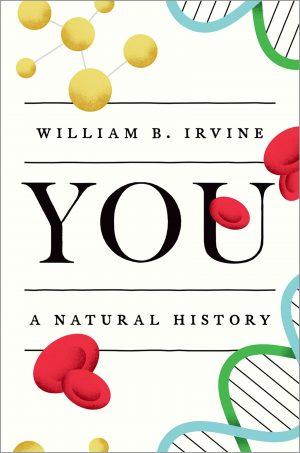
Excerpt from Science
With campaigns of disinformation rampant in America, arming citizens with scientific knowledge is crucial. In the slim volume You: A Natural History, Wright State University philosopher William B. Irvine lays out some of the fundamental science behind human history, human ancestry, life’s history and origin, and the origin of our Universe in simple and engaging prose. He set out, he says, to present a “humanistic” science, not just to tell readers how “they and their world came to exist, but to take this science personally.”
Although the human saga dominates the book, its scope isn’t limited to just human biology or even biology in general. Irvine sweeps from the Big Bang to the genesis of elements and from the coalescence of planets to the origin of life. He is especially enamored of trees—family, descent, and evolutionary—an excitement he apparently shares with many others, as evidenced by our enthusiasm for direct-to-consumer genetic ancestry testing and the proliferation of television programs dedicated to uncovering family histories. His discussions, however, lack descriptions of the experimental basis for the underlying systematic and evolutionary concepts.
In just over a single page, Irvine dispenses with the idea of the ownership of genes and possibly but not explicitly their patentability—a topic that has been widely and voluminously debated. He concludes that although an individual’s atoms might fairly be considered as belonging to him or her, the ownership of genes is more complex, as we each own not a gene but “a copy” of a gene shared by many others. He compares it with owning Robert Frost’s poem “The Road Not Taken.” Like the sequence of a gene, copies of the poem can be made without damage to the original. I’m not at all convinced that the question can be settled so simply. Irvine goes on to argue that not only do we not own our genes, our “selfish genes”—the term coined by Richard Dawkins to describe genes that ensure their own propagation even if they do not benefit the organism—might actually be taking advantage of us.
Throughout the book, Irvine addresses issues of religion and law, and I was especially pleased to see that these discussions, although not themselves scientific, are grounded in thorough research. In his discussion of the fate of the individual after death, Irvine draws a distinction between the body and the mind. He considers the Christian view of resurrection, in which the mind lives on in a “resurrected” body, and the Eastern view of reincarnation. “People who enjoy life don’t want it to end,” he writes. But Irvine thinks our desires will always outpace what we have and prefers the Buddhist concept of reaching nirvana, in which the self no longer matters.
Turning to more practical considerations, Irvine mentions the potential for cryopreservation and the idea of uploading one’s mind to a computer. Here, he misses a magnificent chance to highlight the 200th anniversary of the publication of Mary Shelley’s Frankenstein. “[O]ne thing is certain,” he writes, “before you experience a life after death, if there is one, you will experience a life before death.” Urging readers to focus on the latter, he adds, “[Y]ou would be wise to spend your time and energy living this life as well as you can.”
Irvine mainly presents science as facts and stories rather than as a process and a history of discovery. He does, however, recognize that our understanding of how things work and how things came to be changes with time. For instance, he notes, whereas we once thought that modern humans and Neanderthals were separate species that could not, by definition, interbreed, we later learned from genomics data that Neanderthal genes remain in humans today and that we should more likely be considered a subspecies.
You: A Natural History came to my attention because it purported to be a natural history of humans. But it rose to the top of my list because it was written by a philosopher. I was hoping for an extensive discussion of the philosophy of science. On this front, the book did not meet my expectations. In his introduction, for example, Irvine writes that he will “address some of the questions that arise regarding the meaning of life.” The bulk of this discussion, disappointingly, is limited to only a few pages near the end of the book. It is not terribly engaging or profound.
For a deeper discussion of human origins, history, and ancestry, I would recommend Yuval Noah Harari’s Sapiens or David Reich’s Who We Are and How We Got Here. Nevertheless, Irvine’s conversational tone and brief chapter structure make this book accessible to a broad audience. And if I were to list the topics I’d like to see covered in a general science education, I would include many of the ones that appear in You: A Natural History.

